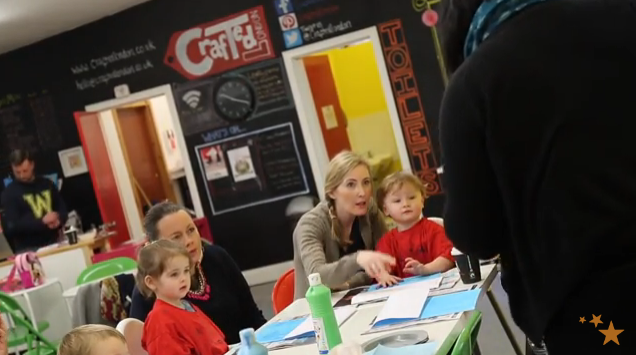When paperwork began to eclipse the creative side of his career, Wayne alighted on a more rewarding outlet for his love of art and talent for fostering creativity in others.
Video case study: How to run a craft workshop
Who’s the entrepreneur and what’s the business?
Wayne Cullum is the owner of Crafted London, which offers art workshops and craft-themed parties for people of all ages, as well as soft-play areas for children, in Southfields, south London.
Wayne, who has loved art for as long as he can remember, went to art college, did a degree in the subject and went on to become a secondary school art teacher for 12 years. Over the years, however, the job became more about admin and less about fostering creativity.
Wayne had thought about running a craft workshop for a long time. He wanted to do something for the community and express his creativity. Crafted London allows him to do just that.
The business features a cafe and a space for pop-up businesses, which have included a hairdresser and a shoe-fitting service. On a day-to-day basis, this space is used as a book corner with book shelves and bean bags.
Another space filled with long tables and chairs is used for craft sessions and dovetails as a party space, as Craft London hosts parties at weekends. The main soft play area can hold about 25 kids at a time and is suitable for ages five and under, while a separate, smaller soft play area caters for younger siblings.
It gets quite busy when the weather’s bad, says Wayne, who also offers seasonal activities such as advent calendar workshops during the Christmas period.
A day in the life of an art workshop curator
Wayne gets to work about 8am, cleans and tidies the premises and sorts the coffee machine out, ready to open to the public at 9am. Throughout the morning people children use the soft play area and people of all ages use the timetabled arts and craft workshops.
Wayne offers a pre-school morning session, then there is a quiet period over the lunch period followed by an afternoon session from 2.30-3.30pm. Finally, there is an afterschool session from 4-5pm.
Some customers are there on a weekly basis and Wayne offers loyalty passes for regular visitors.
The soft play area is invaluable for occupying children during breaks from art classes, which are divided into small sessions in recognition of children’s short attention spans. If any child gets bored, they can enjoy some unstructured playtime and return to the activity if and when they feel like it.
Advice for aspiring craft workshop curators
Wayne offers the following pointers for anyone considering starting a similar business (in which case you could also browse our education businesses and children’s play businesses for sale):
- Do lots of marketing with social media, flyers and maybe even leaflet drops. In the early days, Wayne concentrated on raising awareness of the business’s existence.
- Enjoy being creative. Wayne loves coming up with ideas for activities and being creative. It’s also really important to love working with children and their parents.
- Do plenty of research – then go for it. Make sure there’s enough demand in your area and think about your USP. Be prepared to diversify according to the needs of your prospective customers. Wayne is thinking about setting up an adult studio exhibition space with a cafe bar and running adult art workshops. If you live in an area with a high proportion of elderly people, for example, you could think about catering for their needs.





